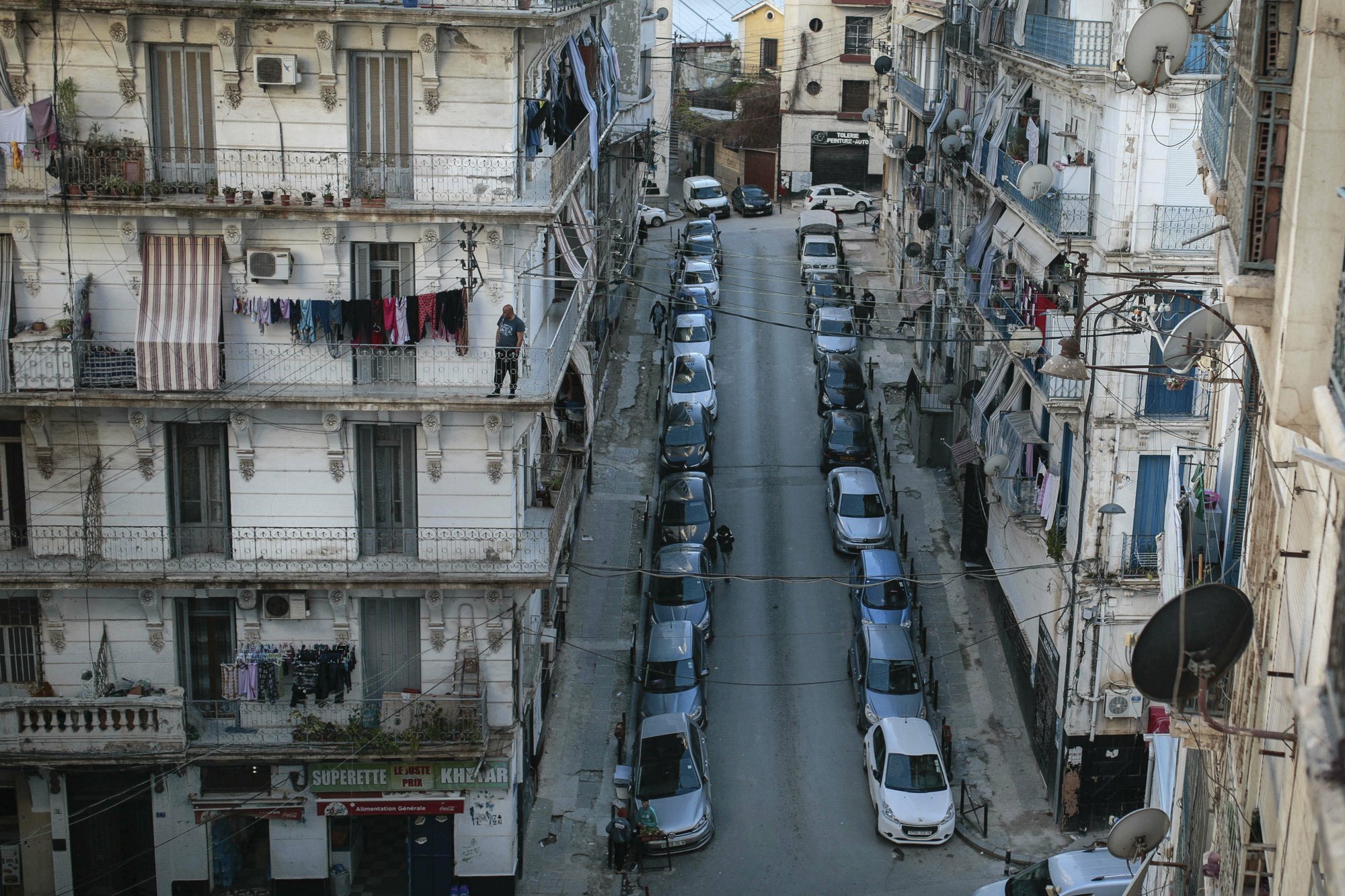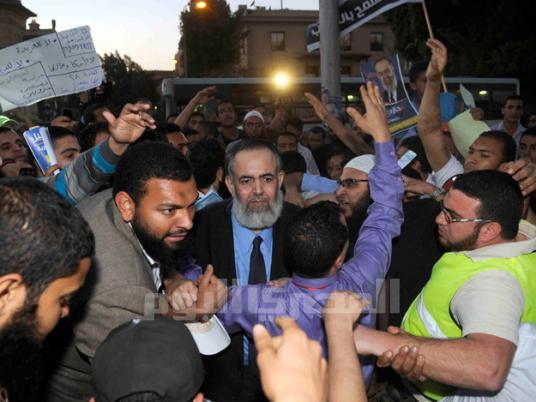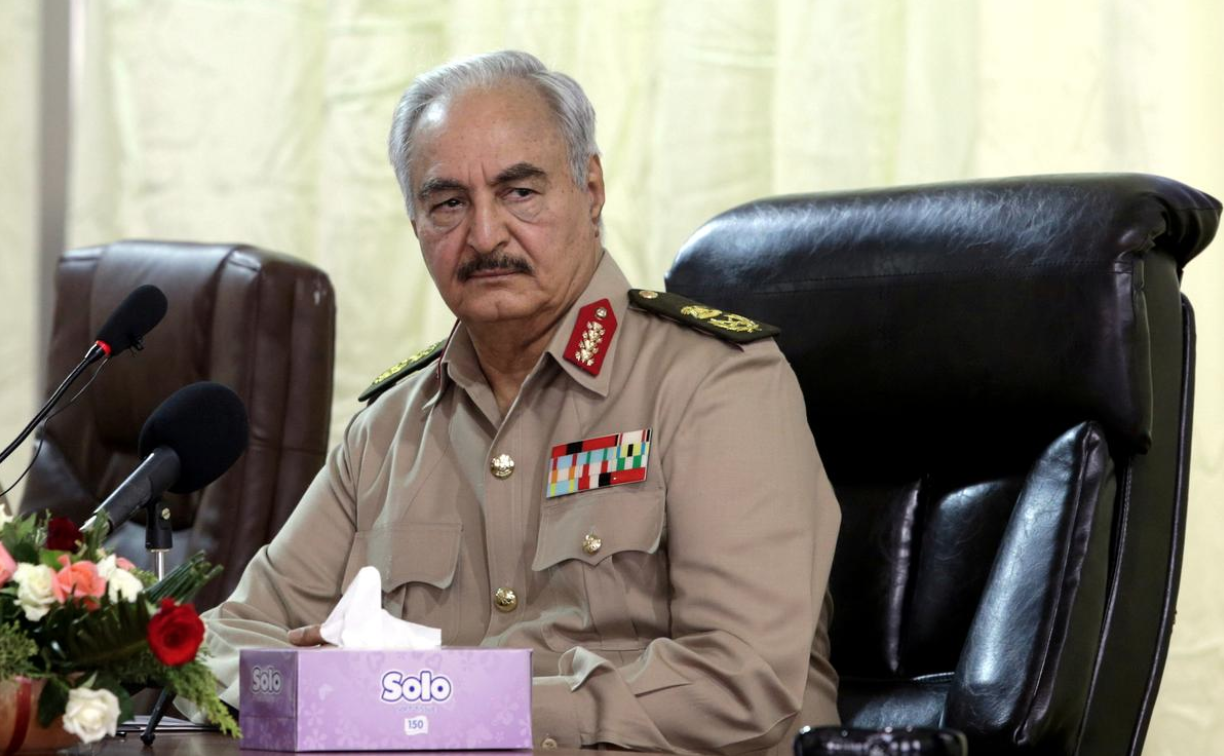Once again Salafis are making headlines, not with incendiary statements, but because of internal rivalries that may threaten their most influential party.
The Nour Party, the largest Salafi political organization, has been recently racked by internal splits that exposed the stand-off between religious and political leaders. Two blocs are believed to be evolving. The first is apparently led by Sheikh Yasser Borhamy, the vice-president of the party’s mother organization, the Salafi Dawah, and the second is spearheaded by Nour’s president Emad Abdel Ghafour, who is widely hailed in Salafi circles as a democratic figure.
The feud, unfolding ahead of forthcoming parliamentary elections, raises questions about the future of a party that surprised observers, emerging as the second most powerful electoral force in the country.
An overdue standoff
Internal elections have recently blown the lid off a dormant dispute between the party’s two factions. Last month, several party members and leaders from the Delta province of Gharbiya tendered their resignation in objection to the polls that they described as flawed.
Faced with an increasing number of complaints, Abdel Ghafour decided to suspend the internal poll. Some contended that the vote was marred by violations aimed at ensuring the victory of candidates with close ties to Salafi Dawah’s preachers, including Borhamy.
However, the party’s executive council refused Abdel Ghafour’s decision and insisted that elections be held. To contain the situation, the Salafi Dawah assigned one of its popular religious leaders to mediate between the two factions.
Meanwhile, a group of angry party members who support the party president's decision established the Internal Reform Front (IRF) in early September to push for an overhaul of the party to liberate politicians from what they see as clerical control.
Mahmoud Abbas, a middle-ranking leader based in Alexandria and a founder of the front, told Egypt Independent that his bloc seeks to reverse the policies implemented by religious leaders over the last eight months. Abbas alleged that Borhamy used his leverage to place loyal figures in key party positions.
“Borhamy trusts people who follow his orders,” said Abbas, who claims his IRF has attracted at least 500 Nour members so far.
“In the last eight months, we were trying to explain that what is happening does not serve the party. Whoever spoke about it was either sacked or pressured to shut up. Only a few shut up, but many resigned and many others were sacked,” he continued.
The IRF demands the postponement of party elections until after parliamentary elections, and the dissolution of the party's executive council and the membership committee, both of which the front alleges are controlled by sheikhs.
Younes Makhyoun, a member of the executive committee dismissed Abbas's comments and denied the existence of an opposition bloc under the latter's leadership. "[Abbas] represents no one but himself and there is nothing called the Internal Reform Front," he said.
He also downplayed the recent feud, arguing that it is a “mere administrative disagreement” over the date of internal elections.
Clerical origins
The Salafi Dawah, one of the best-organized Salafi groups in Egypt today, was originally established by students at Alexandria University in the 1970s to promote ultra-orthodox Islam. The Dawah's preachers have propagated their message through lessons in mosques, conferences, youth activities and social services. Since the 1990s, many of its preachers became TV stars when their programs were regularly aired on Salafi satellite channels.
For decades, the movement remained aloof from politics and even went as far as denouncing political participation.
But, in the summer of last year, the Dawah’s political wing, the Nour Party was granted official status. A few months later, the party had taken the nation by surprise: it had captured almost 25 percent of parliamentary seats, becoming the second largest bloc after the Muslim Brotherhood's Freedom and Justice party.
According to Ahmed Zaghloul, an expert on Salafi groups, recent disputes are the manifestation of an inherent tension between the party's political and religious wings.
“It is the conflict between the sheikh and the politician,” said Zaghloul. This tension has remained unresolved since the founding of the party.
“The majority of the Nour executive council are sheikhs and members in the Salafi Dawah's Shura Council. In most provinces, the leader of the Salafi Dawah is the general-secretary of the party,” he added, saying that the structural overlap had led two distinct functions becoming conflated.
For most experts on Islamist organizations, this blend of proselytizing and political activity prevents Islamists from taking stances that correspond to real political concerns, rather than dogma.
For Zaghloul, the expulsion of the party's first spokesperson, Mohamed Yosry, last year was the first manifestation of the tension in the party.
In 2011, Yosry told the press that he had resigned from the party without explaining why. However, Zaghloul’s new book, “Islamists and the Revolution” says that Yosry was sacked after he praised Nobel Laureate Naguib Mahfouz. His statement elicited controversy among Salafi clerics, who had always alleged Mahfouz's novels contradicted Islam.
“One cannot condone the wrong,” Borhamy had reportedly then said in reference to Yosry’s comments about Mahfouz.
This is not to say that there are major ideological differences between the politician and the sheikh, according to Zaghloul. He said the differences are rather over implementation, specifically whether party decisions should gain clerical approval.
Ashraf al-Sherif, a political scientist at the American University in Cairo, added that Borhamy’s camp wants to empower only “people of trust” while the second camp of Abdel Ghafour seeks to democratize the party.
“Abdel Ghafour wants the party to open up to different internal trends,” said Sherif, an expert on Islamist groups.
Like the Salafi Dawah, the Nour Party derives its ideological foundations from puritanical schools of Islamic jurisprudence, particularly Wahhabism. For a long time, Dawah preachers had rejected democracy as a western heretical invention. After the 2011 revolution, this attitude was revised and the Dawah and its party approved of a democracy that does “not contradict God's laws.”
For Islam Abdel Bary, a 32-year-old Alexandrian member of the Nour Party, the overlap between the Dawah and the party is a foregone conclusion.
"It is the Dawah that created the party," he said. "The Nour Party benefited a lot from the Dawah's networks when it was created. Lay Salafis did not know Dr. Abdel Ghafour but they knew Salafi sheikhs."
Abdel Bary contended that the recent conflict was provoked by Nour founders who do not belong to the ranks of Salafi Dawah and seek a larger role for themselves within the party.
At the moment of the party’s inception, Abdel Ghafour had invited Salafis from outside the Salafi Dawah to join his party, but there were not enough outsiders for them to have "the upper hand" within the party, argued Abdel Bary.
Turmoil at a crucial juncture
Internal tension within the Salafi movement has erupted at a critical moment as they roll up their sleeves for the upcoming parliamentary elections. It raises concerns that the group might disintegrate.
Sherif, the political scientist, acknowledged that the party faces “a big crisis” but he downplayed its potential impact.
“I do not think it threatens the very existence of the party,” said Sherif. “It is normal, it is a new party, it has a lot of members, its structures are not institutionalized enough, and it brings together people of different backgrounds," he said.
“It is practically necessary for both factions to reach a compromise as elections are approaching and Nour leaders are already afraid of radical Salafi groups," added Sherif.
By “radical groups,” Sherif refers primarily to the would-be party of Hazem Salah Abu Ismail, a former presidential hopeful who was excluded from the race due to his mother's dual citizenship, which violated his candidacy.
Abu Ismail had built a broad base of support thanks to his revolutionary discourse and unequivocal statements on the strict implementation of Sharia. His discourse was seen by experts as a source of embarrassment for less confrontational Salafi groups, especially the Nour Party.
According to Gamal Saber, a former spokesperson of Abu Ismail's presidential campaign, the latter is set to launch his party mid-October.
"Our goal is to implement Islamic Sharia and to achieve the highest level of progress for the state," Saber told Egypt Independent. He said the party would run for all seats in the parliamentary polls.
"If Hazem establishes his party, he will take some of Nour's seats," said Zaghloul. "But the Nour Party will maintain its upper hand due to its presence on the street. It is socially very active thanks to the services it provides. Nour remains the strongest competitor to the Muslim Brotherhood."
"[However], Hazem is a product of Facebook and Salafi [TV] channels. He has no strong support base," said Zaghloul.
This piece was originally published in Egypt Independent's weekly print edition.




